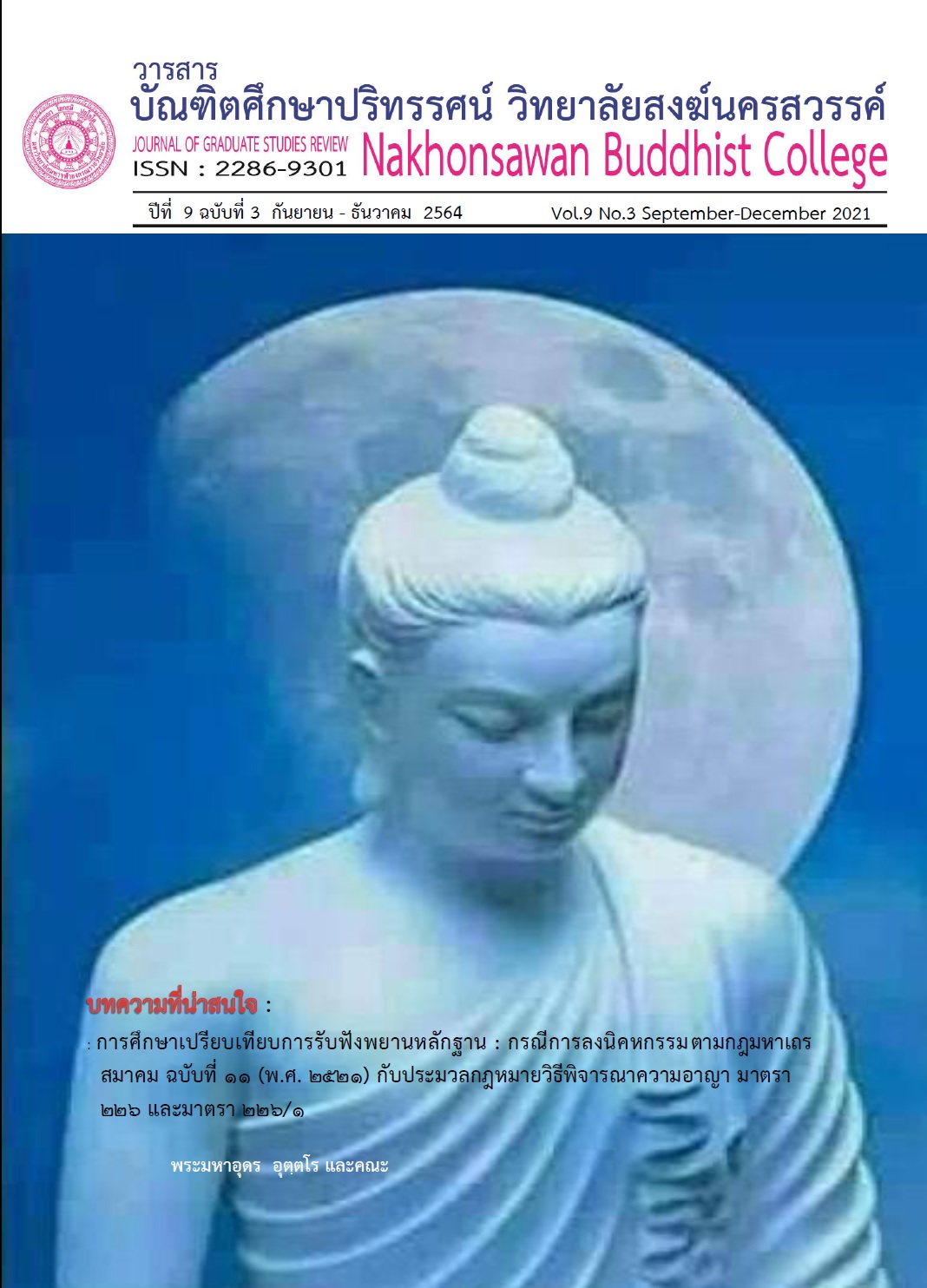ปัญหาทางกฎหมายที่เกี่ยวกับวิธีดำเนินคดีวินัยสงฆ์ตามกฎมหาเถรสมาคม ฉบับที่ 11 (พ.ศ. 2521) ว่าด้วยการลงนิคหกรรมกับการดำเนินกระบวนพิจารณาคดีอาญา ตามประมวลกฎหมายวิธีพิจารณาความอาญา
Main Article Content
บทคัดย่อ
บทความวิจัยนี้ มีวัตถุประสงค์เพื่อ 1) เพื่อศึกษาวิธีดำเนินคดีวินัยสงฆ์ตามกฎมหาเถรสมาคม ฉบับที่ 11 (พ.ศ. 2521) ว่าด้วยการลงนิคหกรรม 2) เพื่อศึกษาการดำเนินกระบวนพิจารณาคดีอาญาตามประมวลกฎหมายวิธีพิจารณาความอาญา 3) เพื่อเปรียบเทียบปัญหาทางกฎหมายที่เกี่ยวกับวิธีดำเนินคดีวินัยสงฆ์ตามกฎมหาเถรสมาคม ฉบับที่ 11 (พ.ศ. 2521) ว่าด้วยการลงนิคหกรรมกับการดำเนินกระบวนพิจารณาคดีอาญาตามประมวลกฎหมายวิธีพิจารณาความอาญา และ 4) เพื่อเสนอแนะแนวทาง แก้ไข ปรับปรุงกฎหมายที่เกี่ยวกับวิธีดำเนินคดีวินัยสงฆ์ตามกฎมหาเถรสมาคม ฉบับที่ 11 (พ.ศ. 2521) ว่าด้วยการลงนิคหกรรมและกฎหมายว่าด้วยการดำเนินกระบวนพิจารณาคดีอาญาตามประมวลกฎหมายวิธีพิจารณาความอาญา เป็นการวิจัยเชิงคุณภาพ (Qualitative Research) ผู้วิจัยใช้วิธีการวิจัยเอกสาร (Documentary Research) เป็นหลัก โดยวิธีเก็บข้อมูลเอกสารจาก พระไตรปิฎกพระไตรปิฎกฉบับมหาจุฬาลงกรณราชวิทยาลัย พระราชบัญญัติคณะสงฆ์ กฎมหาเถรสมาคม ฉบับที่ 11 (พ.ศ. 2521) ว่าด้วยการลงนิคหกรรม กับการดำเนินกระบวนพิจารณาคดีอาญาตามประมวลกฎหมายวิธีพิจารณาความอาญาและเอกสารตำราที่เกี่ยวข้อง
ผลการวิจัย พบว่า 1) วิธีดำเนินคดีวินัยสงฆ์ตามกฎมหาเถรสมาคม ฉบับที่ 11 (พ.ศ. 2521) ว่าด้วยการลงนิคหกรรม พบว่า มีลักษณะคล้ายกฎหมายวิธีพิจารณาความอาญา 2) การดำเนินกระบวนพิจารณาคดีอาญาตามประมวลกฎหมายวิธีพิจารณาความอาญา นับแต่อดีตจนถึงปัจจุบัน กระบวนพิจารณาคดีอาญานั้นจะต้องอาศัยหลักการต่อสู้โต้แย้งของคู่ความ 3เปรียบเทียบปัญหาทางกฎหมายที่เกี่ยวกับวิธีดำเนินคดีวินัยสงฆ์ตามกฎมหาเถรสมาคม ฉบับที่ 11 (พ.ศ. 2521) ว่าด้วยการลงนิคหกรรม กับการดำเนินกระบวนพิจารณาคดีอาญาตามประมวลกฎหมายวิธีพิจารณาความอาญา พบว่า กระบวนการลงนิคหกรรมมีขั้นตอนและวิธีการที่สอดคล้องกับกรณีที่เกิดขึ้นในศาลเหมือนกันและความแตกต่างกันสำหรับการลงโทษผู้กระทำความผิดที่เหมาะสมและยุติธรรมกับสังคมสงฆ์และสังคมชาวไทย 4) เสนอแนะแนวทางแก้ไข ปรับปรุงกฎหมายที่เกี่ยวกับวิธีดำเนินคดีวินัยสงฆ์ตามกฎมหาเถรสมาคม ฉบับที่ 11 (พ.ศ. 2521) ว่าด้วยการลงนิคหกรรมกับการดำเนินกระบวนพิจารณาคดีอาญาตามประมวลกฎหมายวิธีพิจารณาความอาญา สมควรตั้งศาลวินัยสงฆ์ขึ้นแทนระบบนัดหมาย เพื่อใช้ในกระบวนยุติธรรมสงฆ์ โดยศาลวินัยสงฆ์เป็นการกระทำต่อพระภิกษุผู้ทำผิดพระวินัย


